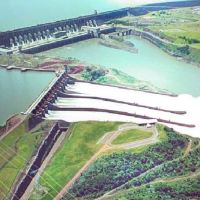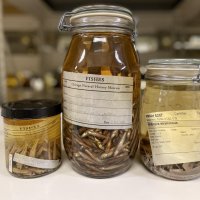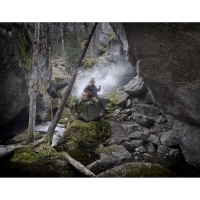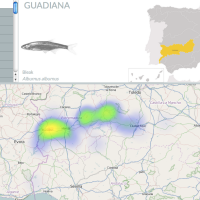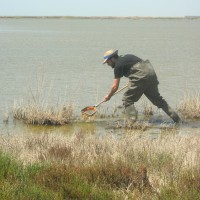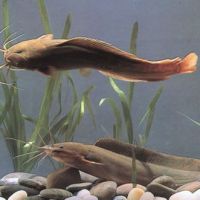Extreme events in running waters
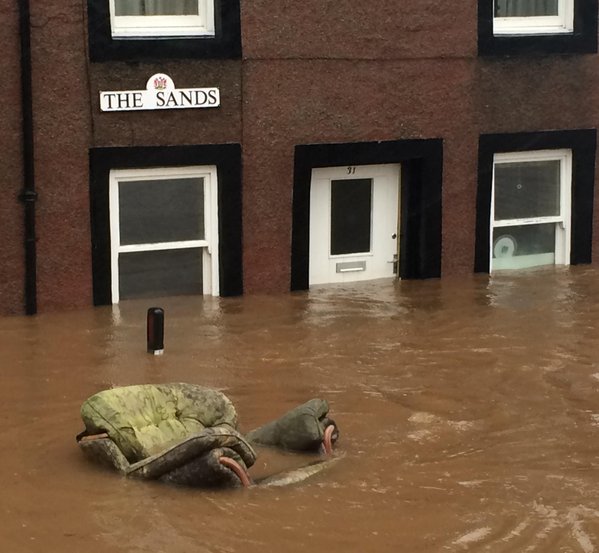
A flooded street in Appleby, Cumbria. Image: Fiona Trott / Twitter.
Over the weekend, heavy rainfall in the north of England caused major flooding in Cumbrian and Northumbrian towns and villages. A Met Office rainfall gauge at Honister Pass in the Lake District recorded 341.4mm of rainfall between 1800 on the 4th and 5th of December, a new UK record for a 24 hour period. The heavy rainfall was partly caused by a persistent flow of warm, wet air from the West Atlantic Ocean, which is currently experiencing high sea-surface temperatures.
The floods have left homes and businesses flooded and without power, cut-off roads and train lines, and brought down trees and bridges. There are also likely to be significant ecological effects which may only be evident over time, for example if salmon redds in the upper reaches of the flooded rivers have been been destroyed. Responding to the floods, some commentators have called for better flood defences to be constructed, whilst others advocate the reforestation of the surrounding hills as a means of intercepting and buffering heavy rainfalls.
Commenting on the floods in Northern England, Professor Dame Julia Slingo, Met Office Chief Scientist, said:
“It’s too early to say definitively whether climate change has made a contribution to the exceptional rainfall. We anticipated a wet, stormy start to winter in our three-month outlooks, associated with the strong El Niño and other factors.
However, just as with the stormy winter of two years ago, all the evidence from fundamental physics, and our understanding of our weather systems, suggests there may be a link between climate change and record-breaking winter rainfall. Last month, we published a paper showing that for the same weather pattern, an extended period of extreme UK winter rainfall is now seven times more likely than in a world without human emissions of greenhouse gases.”

RNLI volunteers rescue stranded residents from flooded streets in Carlisle. Image: RNLI
Such extreme weather events are a natural feature of climate variability, and help shape the forms and functions of freshwater ecosystems, according to ecologists Mark Ledger and Alexander Milner from the University of Birmingham, UK. However, climate change is shifting the magnitude and occurrence of extreme weather events, and understanding their consequences for river and stream ecosystems is an key research priority.
In a newly published special issue of the journal Freshwater Biology, editors Ledger and Milner have compiled 14 articles which examine extreme events affecting river and stream ecosystems across the world, including heat waves, fires, droughts, heavy rainfall and floods, tropical cyclones, storm surges and coastal flooding.
The open-access issue contains reviews of existing scientific literature and observational and experimental case studies which synthesise knowledge of extreme events and their ecological effects on freshwaters, as a means of guiding future research and management.
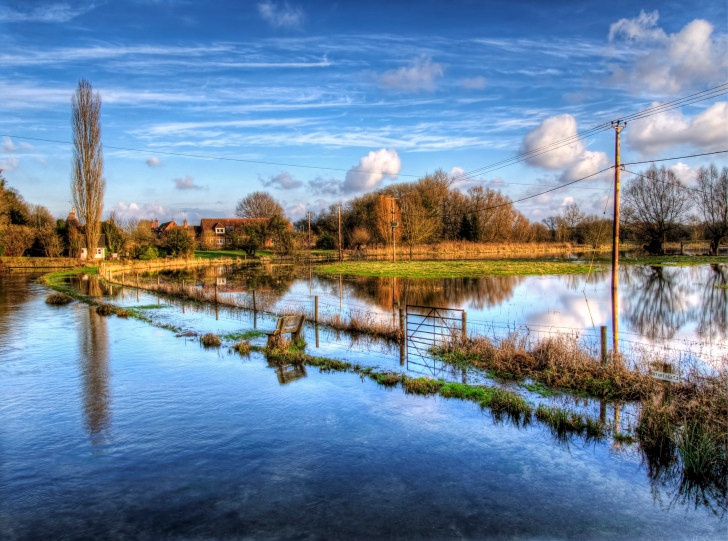
Flooded fields around the River Test, UK in 2013. Image: Neil Howard | Creative Commons | Flickr
The collected papers suggest that the ecological impacts of single events such as catastrophic floods, droughts and heat waves are highly context dependent. Impacts can be both positive or negative, and are dependent on the magnitude and extent of extreme events and their timing relative to life cycles of the affected species (e.g. spawning salmon).
Not all extreme events generate extreme ecological impacts, but combinations of events that cause multiple stresses are likely to have the most adverse ecological consequences. Ledger and Milner suggest that long-term monitoring programmes and sensor networks are essential in describing rare and unusual events. Similarly, ongoing experiments (see the MARS experiments on Alpine streams, for example) are important in understanding the mechanisms of extreme events which are likely to get stronger and more frequent in the future.






